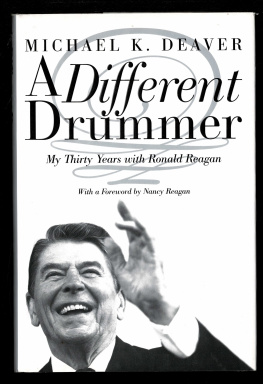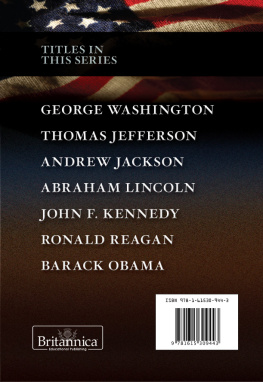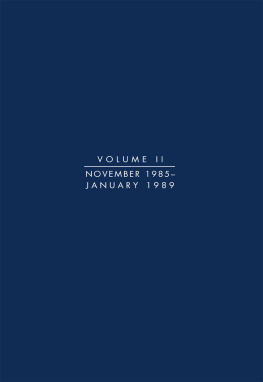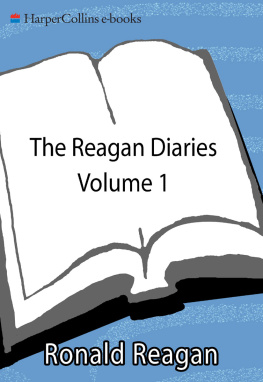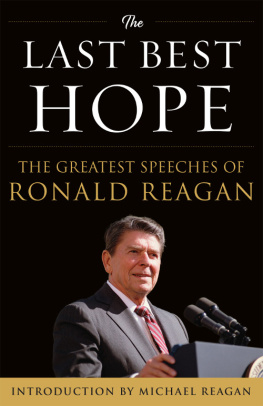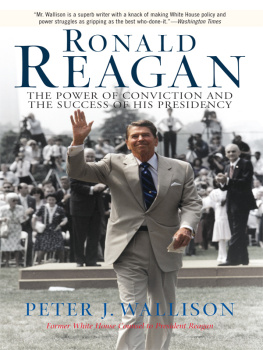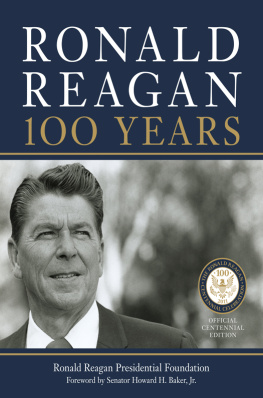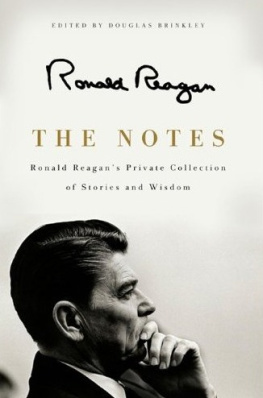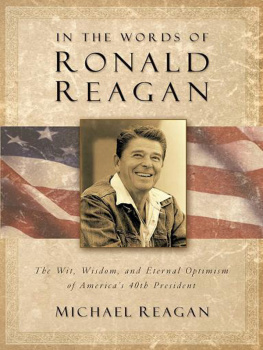A t a time when much of the United States was in doubt and confusion, Ronald Reagan made his grand entrance onto the national stage with remarkable confidence, not so much in himself as in America. His unwavering optimism changed the way we thought about ourselves and the way the world looked at us. As I write these pages, America embarks on a new war, a war not unlike the battle Reagan led against the Soviet Union. We again face a committed enemy, one that may take decades to vanquish. Like Reagan, George W. Bush has made the conflict the focus of his presidency, and I am confident that future historians will make many comparisons between the two leaders abilities in mobilizing the American people for a long, protracted struggle against a gray, shadowy adversary. As Bush begins his calling, historians are now chronicling the end of the Cold War so that future generations will understand Reagans role in the demise of communism. I have my prejudices on the matter, but what I do know is that it is sad beyond expression that he cant acknowledge the many glorious achievements of his public life. Reagan lives today in a state of confusion, victimized by an illness that robs him of any coherent memory.
Perhaps because of this great, tragic irony, I felt a need to remember him, maybe even a duty. After all, I was lucky enough to have a front-row seat to this critical turning point in our country. I offer this book, then, as an attempt to place on the record my recollections of a remarkable man whom I had the pleasure of working alongside for more than twenty years.
A second deciding factor in writing A Different Drummer was Edmund Morriss much anticipated biography of Reagan, Dutch . Long before Morris had finished the book, it had become clear that he had struggled, and in his own mind failed, to truly understand Reagan. Lou Cannon, an esteemed journalist who has known Reagan far longer than Morris and has written extensively about him, once concluded it was impossible to figure him out entirely. The truth is that most people are more simple or complicated than can be fully explained by anyone, and Reagan is no exception. Still, I hope that I can make a small contribution to understanding Reagan by passing on these accounts of our time together. People can draw whatever conclusions they want from these anecdotes. I would never pretend to have solved the riddle of Reagan, and this book will hardly satisfy those who want a penetrating insight into the mystery of the man. Maybe, though, readers will find it entertaining and even enlightening at times.
I should pause here to tell you what this book is not. This is not a biography in the sense of a work based on vast research and long months spent combing through personal archives. I have never kept a diary, nor do I have the inclination to pore over memoranda and public documents that summarize activities of that time. There will be no footnotes or excerpts from lengthy interviews. This is a book of memories inspired by a need to share whatever insights I can into a very public yet thoroughly private man who has confounded everyone who has tried to sum up his life.
The title of the book comes from my belief that Reagan was, in part, so difficult to understand because he was guided by a source of inspiration that only he understood. I have never known a person to be so sure of what he thought he knew or so accepting of things he could never understand. He was not a Hamlet, not a man of angst. Reagan had a profound spiritual faith that grounded him and left him with a nearly perpetual peace of mind. This is not to say he didnt have his moments of doubt and anger, but those times were rare. He didnt have trouble conveying confidence because he was sure of what he thought. He didnt have to fake it, his acting ability aside. His steady sense of purpose grew from his complete acquiescence to a drummer only he could hear.
As for his well-documented remoteness, the part of his personality that drives his biographers crazy, a lot of theories get bandied about as to what shaped Reagans personality. He couldnt see very well as a child until his nearsightedness finally and belatedly led to him getting glasses. Is that why he was so disconnected from people? His fathers drunkenness is often cited as having had a profound impact on his behavior. Perhaps this is the reason he learned to keep his distance from people, or why he invented a world of make-believe where America was always a beacon of hope on a shining hill. Far be it from me to analyze him. After all our years together, I could never completely understand what made him tick. I did, however, observe the traits that made him so successful as a leader and so peculiarand wonderfulas a person.

